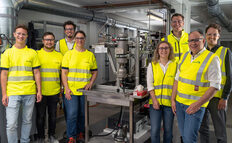- The project aims to convert CO2 from cement production into ethylene using a new CO2 electrolysis process.
- An industrial-scale demonstrator will convert up to six kilograms of CO2 per day by 2026.
- The project is part of H2-Reallabor Burghausen with 37 partners from various sectors.
- The German Federal Ministry of Education and Research funds 50% of the project, totaling 1.67 million euros.

CO2 to Ethylene Conversion
Rohrdorfer has initiated a process to convert CO2 from cement production into ethylene. This innovative method aims to establish a CO2 circular economy and reduce dependence on fossil raw materials. The technology utilizes a new type of CO2 electrolysis to produce formic acid and hydrocarbons like ethylene.
H2-Reallabor Burghausen Project
The "CO2 to ethylene" initiative is part of the H2-Reallabor Burghausen – ChemDelta Bavaria research project, which includes 37 partners from industry, SMEs, start-ups, and research institutions. The project, launched in April 2023, focuses on using hydrogen as a material basis in the chemical industry. Rohrdorfer's Net Zero Emission team adapted their plant for green ethylene production based on previous research.
Scaling Up Production
Initially, a test stand producing a few hundred grams of ethylene per hour was set up. The next phase involves an industrial-scale demonstrator with a conversion rate of up to six kilograms per day. By 2026, the project aims to convert one kilogram of CO2 per hour into ethylene on a container scale.
Operational Advantages
The system operates at a pressure of 30 bar, allowing the product mixture to be easily filled into pressurized gas cylinders. This facilitates transportation to partners within the H2-Reallabor Burghausen project, enabling further testing and processing of the ethylene.
Funding and Duration
The "CO2 to ethylene" project is 50% funded by the German Federal Ministry of Education and Research, with a total funding amount of 1.67 million euros. The project will run for four years, supporting the development and scaling of this innovative technology.

